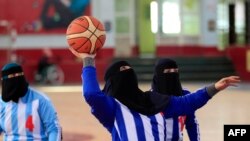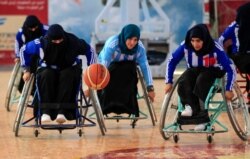Living through years of Yemen's devastating war has been a constant struggle for Afaf Mohammed al-Adwar, who uses a wheelchair because of congenital spinal damage.
But she is now determined to demonstrate her ability to cope by participating in a women's wheelchair basketball championship.
The 16-year-old sportswoman joined dozens of other girls and women with mobility impairment in a wheelchair basketball tournament that was held in Sanaa this month.
She told VOA that her participation was "the first step" toward showing the plight of Yemen's women and girls with disabilities during four years of civil war between the government and Iran-backed Houthi rebels.
"We are trying to show people that we are not just disabled, but we are able to do whatever we aspire to," al-Adwar said.
She said that women and girls with disabilities in Yemen are on the margins of society, excluded from basic humanitarian assistance, while at the same time facing gender-based discrimination.
"The society frowns upon letting girls leave their houses, let alone allowing them to play sports. It was hard for my family at first to let me play, but when they saw me in the games, they started encouraging and supporting me," she told VOA, adding that she was grateful to be a part of an attempt to change the common mentality of a rather conservative society going through conflict.
Five-team competition
Five teams competed in a weeklong championship that started on December 7 and was sponsored by the Red Cross and other organizations in Yemen working to benefit people with disabilities.
The winners will compete in a regional championship next year in Beirut.
Al-Adwar's team, al-Tahadi Organization for Supporting Women with Disabilities, came in fourth place and received a special award for their "sport spirit."
Jihad Hammoud Ahmed Jaber, a spokesperson for the al-Tahadi Organization, told VOA such activities will empower girls and women with disabilities to become active members of their communities. At the same time, they will help change societal perceptions by creating a more inclusive atmosphere for everyone.
"The goal of having a women's basketball championship was to make the women get out from their isolation, especially amid the ongoing war in the country,” Jaber said. “Those who didn't allow their daughters to play a sport, we wanted to show them how this can help their daughters physically and mentally and how it can give their daughters strength and empowerment."
The conflict in Yemen escalated after Iran-backed Houthis overran Sanaa in September 2014. In 2015, the conflict turned into a proxy war when an international coalition led by Saudi Arabia launched a military and economic campaign against the Houthis.
The United Nations calls the situation in Yemen the world's worst humanitarian crisis. It has warned that people with disabilities are the country's most vulnerable, facing immense hardship to get much medical aid or to move from battlefield zones to safer refuges.
Most excluded
Rights group Amnesty International estimates that the devastating conflict has left 4.5 million Yemenis, or 15% of the country's population, with some form of disability. In a 50-page report published this month, the organization concluded that the conflict has limited health services for Yemenis with disabilities and taken away their rights to education and employment opportunities, while adding risks from violence and living in displacement.
It said some people with disabilities were separated from their families and left behind as people fled war "because the trip was too difficult for the person with a disability to undertake."
"Yemen's war has been characterized by unlawful bombings, displacement and a dearth of basic services, leaving many struggling to survive. The humanitarian response is overstretched, but people with disabilities — who are already among those most at risk in armed conflict — should not face even greater challenges in accessing essential aid," said Rawya Rageh, the group's crisis adviser.





